Bootle
Formed 1879. Wound up 1893.
Founder member of Division Two 1892. Resigned 1893.
Kit History

1879-1882
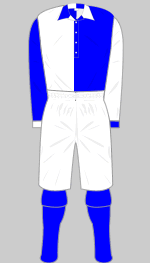
1882-1883 c
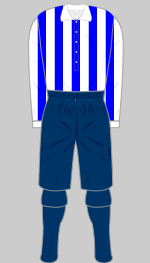
1883-1887 a b f
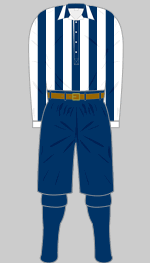
1887-1888 f
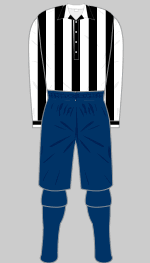
1888-1892 d
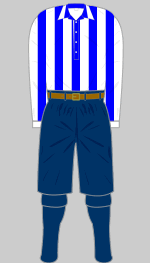
1892-1893 e
Background
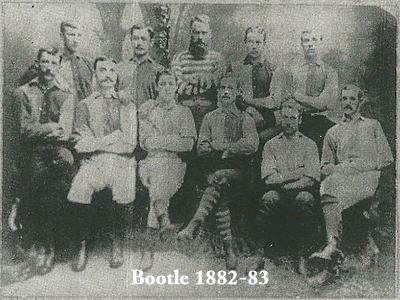 In the 1880's Liverpool's two strongest teams played each other at least twice every
year and often in Cup competitions. These Merseyside derbies were always
competitive and controversial, involving disputes and appeals and were
watched by large passionate crowds. No change then from today, except the
two teams were Everton and Bootle.
In the 1880's Liverpool's two strongest teams played each other at least twice every
year and often in Cup competitions. These Merseyside derbies were always
competitive and controversial, involving disputes and appeals and were
watched by large passionate crowds. No change then from today, except the
two teams were Everton and Bootle.
When the Reverend Alfred Keely moved to Bootle in 1879 to became Deacon of St John's Church, he discovered that only the code of rugby football was in existence. Having a love of the association game, he formed with friends Bootle St Johns AFC and secured land suitable for a playing pitch close to Liverpool docks.
The team was made up mostly of former public school players, including Alfred Keely and his two brothers, and their first fixture on 7 February 1880 was against Everton in Stanley Park whom they beat 2-0. At Christmas the suffix St John's was dropped and they became Bootle AFC. That season they played and beat Newton Heath (prior to being re-named Manchester United) and also had fixtures against Bolton Wanderers and Blackburn Olympic. The following season Bootle entered the FA Cup.
However, in 1882 the existence of Bootle was in doubt following the transfer of Reverend Keely to a parish in Wimbledon and the exit of the Public School players who formed a new team called Liverpool Ramblers which exists today with its clubhouse at Crosby. Later that season Bootle had the satisfaction of beating Liverpool Ramblers 3-1 in the final of the Liverpool Cup in front of the largest football crowd to watch a match in the city to date. The photograph of that cup winning side (above) illustrates the casual attitude to team colours of the period. Players, who provided their own kit, were expected to wear shirts in their team colours (blue and white in this instance) and as long as they could be distinguished from their opponents, any old design would do. Furthermore, a mixture of white and dark navy knickers are in evidence as well as all sorts of socks.
During the next few seasons matches were played against local Lancastrian sides, including Preston, Blackburn and Burnley but the most contested, attracting the biggest gates, were the annual local derbies against Everton culminating in a crowd of 16,000 in the 1888-89 season.
Perhaps the key decision which affected the future viability of Bootle FC occurred when their rivals Everton were elected as one of the founder members of the Football League while Bootle's application was rejected. Instead the club joined the Football Alliance in 1889 and finished second in the competition which included Newton Heath, Sunderland, Birmingham, Crewe and Nottingham Forest.
Despite the Football Alliance becoming Division Two of the Football League, home gates proved disappointing and combined with the expense of the away journeys and a second from bottom finish in 1890, the portents were not good. The proximity to Everton, who had moved from Anfield to Goodison Park and were now a more successful and established club, further reduced the home gates of Bootle and the club was wound up at the end of the 1892-93 season. Bootle was the first club ever to resign from the Football League and their place was taken by Liverpool FC.
The above condensed history was written by Jonathon Russell based on Tony Onslow's The Forgotten Rivals - A History of Bootle Football Club 1880-1893 published by Countywise.
Sources
- (a) Association of Football Statisticians - provided by Pete Wyatt
- (b) Greger Lindberg
- (c) Keith Ellis
- (d) Lost Teams of the North (Mike Bradbury 2016)
- (e) Athletic News (13 February 1893) retrieved by Dave Wherry from the British Newspaper Archive
- (f) Charles Alcock's Football Annuals 1869-1891 researched by Robin Horton